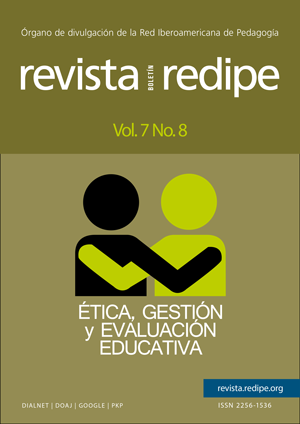Analysis of relevance of the competences for the academic writing with the students of the Experimental Sciences Majors
Main Article Content
Keywords
relevance, competences, academic writing, experimental sciences
Abstract
The research was carried out in the Experimental Sciences Majors which included the students of Chemical Biology, Laboratory and Exact Sciences. Most of these students show limited basic competences to make academic writings due to the weak knowledge of reading and writing techniques received by Language and Literature. Proposing literacy as a transversal axis to enhance the skills of future professionals. The objective was to determine the competences of students for academic writing. The inquiry has a qualitative approach, non-experimental design, documentary, and field, supported by the inductive method. The sample was non-probabilistic of intentional type constituted by 160 students. The technique of data collection was the survey with its instrument the questionnaire. The results obtained established that learners have little interest in reading, practice writing just for academic assignments making mistakes or omissions, so they have problems when writing specialized content. It is concluded that they have not mastered the minimum skills to write academic papers according to the level they are studying. It is recommended to development reading, writing and research initiation training workshops
References
Cañedo, M., Argüelles, & Iglesias. (2014, p.6). La escritura Académica. Barcelona: Octaedro. Criollo, F. (23 de 04 de 2017). La lectura es un hábito en construcción en el Ecuador. El Comercio.
Educación, M. d. (2016). CURRÍCULO DE LOS NIVELES DE EDUCACIÓN OBLIGATORIA. Quito. El Comercio. (08 de 09 de 2016). 62 047 personas todavía no se han alfabetizado en Ecuador. Actualidad, pág. 1.
Férnandez, L. (2010, p163). Interdisciplinariedad en la construcción del conocimiento: ¿Más álla de Bolonia?
García Romero, M. (2008). Investigaciones sobre escritura universitaria en Venezuela. San Cristóbal: Universidad de Los Andes.
Hammer, M., & Champy, J. (2005). Reingeniería. Bogotá: Norma.
Hernández, G. (2009, p.13). ESCRITURA ACADÉMICA Y FORMACIÓN DE MAESTROS ¿POR QUÉ NO ACABAN LA TESIS? Tiempo de educar, 31.
Hernández, R. (2003). Metodología de la investigación. México: McGraw-Hill Interamericana.
Kerlinger, F. (1979). Enfoque conceptual de la investigación del compórtamiento. México: Interamericana.
Larrea de Granados, E. (15 de Febrero de 2018). El currículo de la Educación Superior desde la Complejidad Sistémica. Obtenido de www.ces.gob.ec: http://www.ces.gob.ec/doc/Taller-difusion/SubidoAbril-2015/curriculo_es-sistemico%20-%20e%20larrea.pdf
MinEduc. (18 de Febrero de 2018. p13). educacion.gob.ec. Obtenido de https://educacion.gob.ec/wpcontent/uploads/downloads/2016/08/Curriculov2.pdf
Montalegre, A. (2010). Estrategias para desarrollar oralidad, lectura y escritura. Bogotá: Magisterio.
Niño, V., & Pachón, T. (2011). Cómo formar niños escritores. Bogota: Eco Ediciones.
Pujato, B. (2011 , p. 56). El ABC de la alfabetización ¿Cómo enseñamos a leer y a escribir? Santa Fe: Homo Sapiens Ediciones.
Ricci, C. (2012). La lectura y la escritura en la foramción académica, docente y profesional. Edutecne.
Sánchez, A. (15 de 01 de 2018, p.11). Elementos de escritura académica. Obtenido de Revista virtual: http://revistavirtual.ucn.edu.co
UNESCO. (1993). Proyecto principal de Educación en América Latina y el Caribe. Santiago: OREALC.
Vygotsky. (1995). Pensamiento y Lenguaje, Teorias del desarrollo cultural de las funciones psíquicas. Obtenido de https://www.espaciologopedico.com/noticias/det/2124/levvisgostky-y-sus-aportes-social-e-historico-en-la-lectoescritura.html
Zanotto, G., & González, M. (2012). Estrategias de lectura y escritura para el bachillerato. México: Trillas.


